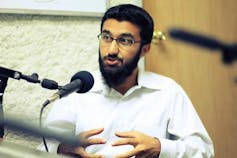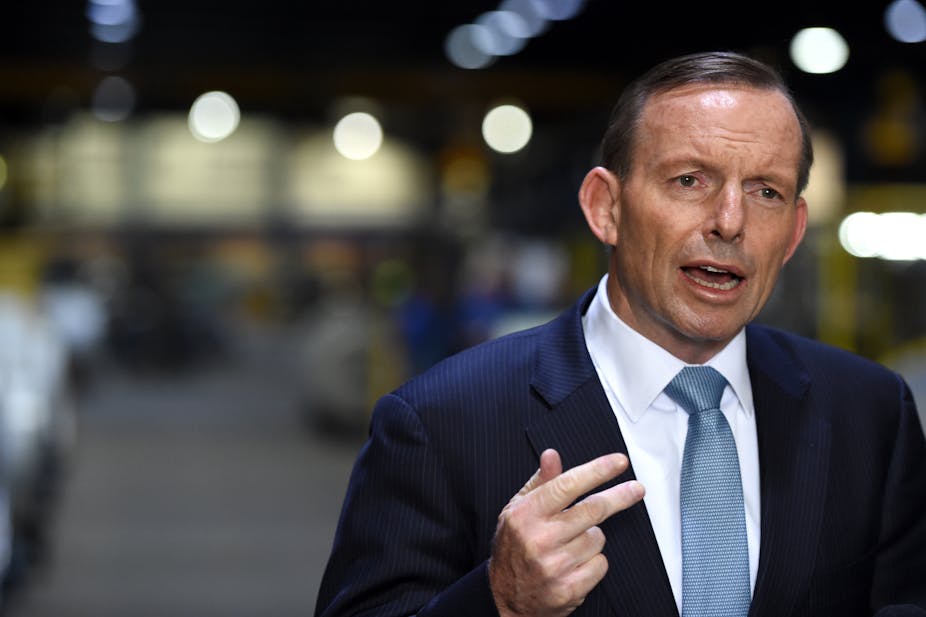Suddenly, the debate about the need for freer speech has transformed into one about the limits that should be imposed on speech. And key allies of Tony Abbott in the earlier argument have become critics in the new one.
In response to a planned public lecture in Lakemba on Friday sponsored by Hizb ut-Tahrir, Abbott on Wednesday promised to “red card” “preachers of hate”.
Hizb ut-Tahrir is a cross national group that promotes the idea of an Islamic state operating under Sharia law.
Friday’s lecture is titled “The war to end a blessed revolution” and the screed reads: “America has initiated yet another war, rounding up its puppets and allies to attack the Syrian revolution, while using intervention in Iraq as a convenient excuse. Why, after 3 years of waiting, has America chosen this action now? What is the politics and reality behind this renewed war and what does it aim to achieve? How should Muslims respond as America attacks the most potent uprising in the Muslim world in the last century: the revolution of Syria?”
Confronted on radio by Alan Jones demanding to know “are you before Friday as Prime Minister of Australia going to proscribe this movement?” Abbott sympathised with Jones’ sentiment, declaring “I’m frustrated and angry myself”.
“We’ve looked at banning them, but we were advised under existing law we can’t do it.” But he held out the possibility of a ban under the foreign fighters legislation now before Parliament.
“At the moment we can only ban organisations that engage in terrorism,” while under the proposed law “it will be an offence to promote terrorism, not just to engage in terrorism,” the PM said.
When that legislation was passed he would need fresh legal advice to determine whether the group fell under the changed law. “But there is no doubt they are an organisation that campaigns against Australian values, that campaigns against Australian interests.”
Meanwhile – and without needing a legal change – he promised to swiftly “put in place a system whereby these preachers of hate, such as the individual who I believe is the top drawer speaker on Friday night” were not allowed into Australia.
“By all means let Australians who want to say stupid things say stupid things, but there’s no point importing troublemakers from overseas to stir people up … We are changing the law that will make it easier to ban organisations like Hizb ut-Tahrir. But before that even we should have a system in place which red cards these hate preachers and stops them coming to Australia.”
(Abbott went into military jargon with his verb to “red card”. When the Super Hornet missions in Iraq decide a target isn’t suitable for bombing, they can “red card” (abort) the attack. The Australians have already used the red card once, according to a military briefing on Wednesday.)
Prominent free speech advocates Tim Wilson, the Human Rights Commissioner, and John Roskam, head of the Institute of Public Affairs were both vigorous campaigners for the government’s plan – later abandoned - to water down the Racial Discrimination Act.
But on the foreign fighters legislation they are concerned about aspects affecting free speech.
The bill introduces the offence of “advocating terrorism”. A person commits an offence if they intentionally counsel, promote, encourage or urge the doing of a terrorist act.
The legislation’s explanatory memorandum says the restrictions on freedom of expression “are a reasonable, necessary and proportionate measure in order to protect the public from terrorist acts”.
Roskam is concerned that the provision is very vague. “You have to be specific on the action we are attempting to prohibit. If you think laws against incitement to violence are not strong enough, you have to explain why – what you are attempting to capture. Simply to say ‘terrorism’ is not enough.”
He warns that without tighter framing the law could rebound on unintended targets. “Lots of people define Israel as a terrorist state.”
Wilson fears florid talk about “hate speech” can “justify censorship all over the place”. He is considering putting in a personal submission to the current parliamentary inquiry into the legislation, urging a tighter definition of the advocacy of terrorism. Wilson says it is unclear where the line would be between the advocacy of terrorism and for example attacking the coalition’s air strikes in the Middle East.

Responding to Abbott, Uthman Badar, spokesman for Hizb ut-Tahrir said that Friday’s event “seeks to elucidate the reality of US foreign policy with regards Syria and the Syrian uprising”. He also said the speakers were all local.
One result of Abbott’s language was to draw more attention to the function. A more prudent approach might have waited to hear whether in fact there was incitement or just a general political rant.

